Fortunetellers at Your Spiritual Service
It had been a long night, but a perfectly executed one.
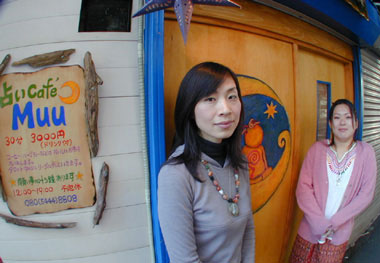 I pulled myself off the sidewalk and started moving laterally for the first time in hours. An evening of excessive imbibing in the same location as a scheduled meeting for the following morning was an old trick I learned in journalism school.
I pulled myself off the sidewalk and started moving laterally for the first time in hours. An evening of excessive imbibing in the same location as a scheduled meeting for the following morning was an old trick I learned in journalism school.
My jacket pocket produced the crumpled note: "Fortuneteller, 10 AM on Sunday, Kichijoji, under the tracks. Stay sober, you bum - Junko."
I could see the shop door on my left. I pawed for the handle, connecting on the first try.
Yuki's dream went like this. While in an elevator with her boyfriend, she noticed two yakuza on either side of her. Two men with loud suits, missing pinky tips, and gruff personalities are not completely unusual in a big city like Tokyo, she thought, but what came next was: one of them came up behind her with a pair of scissors and began...well...cutting her hair.
A haircut from a yakuza? She wondered: What did it all mean?
"You might be trying to make a departure from your dark past," explains Sasa, one of a handful of young fortunetellers who work alternating sessions within two tiny shops directly beneath the Inokashira Line tracks in Kichijoji, west of Tokyo. "It seems as if strong energy is coming out from inside you, pushing you more and more into the future."
Rather vague? Perhaps. Mysterious? Indeed. Helpful? Well, yes, at least Yuki thought so. (She let out a huge sigh of relief upon hearing Sasa's opinion.)
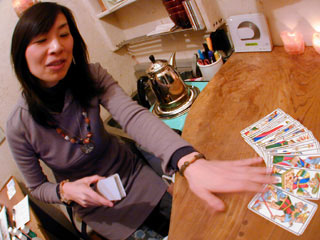 Where once thought of as a surreal, bead-wearing elderly figure residing in a dusty parlor and plying a crystal ball amid a drawn-curtain backdrop, a fortuneteller in Japan today is truly a counselor. Predicting the future is one thing, but offering guidance - without simultaneously being the customer's sole crutch of reliance - is usually much more important. And in these uncertain economic and social times, a lot of Japan's increasingly troubled populace is turning to spiritual discovery for all that ails them.
Where once thought of as a surreal, bead-wearing elderly figure residing in a dusty parlor and plying a crystal ball amid a drawn-curtain backdrop, a fortuneteller in Japan today is truly a counselor. Predicting the future is one thing, but offering guidance - without simultaneously being the customer's sole crutch of reliance - is usually much more important. And in these uncertain economic and social times, a lot of Japan's increasingly troubled populace is turning to spiritual discovery for all that ails them.
The relationship between a fortuneteller and customer can be, it is said, similar to that of doctor and patient; in the end, it is about setting one onto a proper path, a road to self-improvement.
The first step in this journey is to relax. Atmosphere is one key element.
In Muu, where Sasa works three times a week, the confines are small and cozy. The cafˇ has four seats around a slot for the soothsayer in the center. A mix of wispy new age piano and Aborigine pipe music wafts through the stucco chamber. Burning candles impart a gentle aroma. The buzz of motorcycles on the street outside and the rumble of the trains above aren't allowed to be intrusions; this is a place to garner peace.
Here, Sasa uses pleasant conversation to slowly weed out the crux of the issue bothering her customer. "I try to find the original reason of what happened to sort it out," she says of her first encounter with a customer. "I then access or approach the customer's mind."
Kyoko, who holds services next door in Ja Ja, says that today's customers are more in touch with their spirituality when compared to days past.
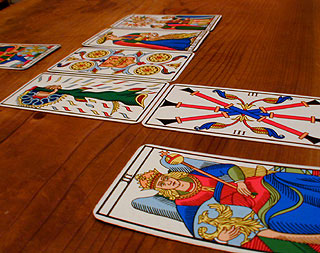 "Many times I don't even have to do a divination; the customer already knows what he needs," explains the seven-year veteran of the trade. "My work is almost like a confirmation of what the customer has in his mind."
"Many times I don't even have to do a divination; the customer already knows what he needs," explains the seven-year veteran of the trade. "My work is almost like a confirmation of what the customer has in his mind."
With necklaces and bracelets strung of various-shaped crystals, Sasa uses Tarot cards to delve into that inner spirit. Such prognosticating standards as palm reading and a crystal ball are not her forte. "Tarot is a mirror to reflect your subconscious mind," she says.
A Tarot deck contains a selection of colorful and grotesque medieval depictions, or archetypes, to represent the various levels of human development from birth on through to death. The cards can be broken into two divisions; one for telling the story of the journey, beginning with birth, and the other for giving detailed descriptions of the various people and events we encounter along the way.
A reading can of the cards can take place to answer a very specific question. After the birthdays of the parties involved in the matter are noted, a few cards are drawn from a shuffled pile and laid onto the table. Marriage and job security are common topics of concern. Much of the fortuneteller's subsequent opinion rests in the orientation and "energy" between the cards.
Should the reading have a negative connotation, Sasa will apply aromatherapy. Like a painter and his paints, Sasa has a large variety of aromatic oils. A whiff from any of the nail polish-sized bottles - with such names as "Joy" and "Peace & Calming" - is intended to tap that one special spot of distress. This is where the healing can begin.
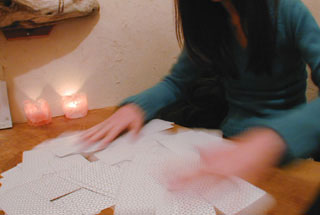 "Aromatic oils reach that consciousness to see and heal, if need be. In everyday life, we endure difficult times. During which we can lose what is important, what is precious in our life. I want to reach back to our original minds."
"Aromatic oils reach that consciousness to see and heal, if need be. In everyday life, we endure difficult times. During which we can lose what is important, what is precious in our life. I want to reach back to our original minds."
The use of aromatic oils in healing goes back 5000 years. The Egyptians were the first to use herbs and extracted oils from plants for medicinal purposes.
Sasa's professional practice by contrast is still in its infancy. After one year, roughly 80% of her customers have been women. Her spiritual training primarily took place during a 3-month course at The Findhorn Foundation, a spiritual community in Scotland where she was able to understand the ubiquity of spiritual energy. "Harry Potter's wand is one symbol of energy, but really spiritual energy can be found anywhere," she says while pointing to a teacup.
Sessions are not cheap. Thirty minutes will set back spiritual seekers 3000 yen, with each additional 5-minute period costing 500 yen. Coffee, juice, and tea are part of the service.
One of the charms of the job, say both ladies, is the ability to take a first-hand peek into people's lives. But with many of society's once-hidden problems surfacing since the beginning of the collapse of the economy a decade and a half ago, such voyeurism can be quite disturbing.
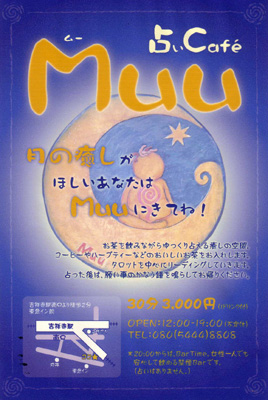 "I can really see the darkness in the world," relates Kyoko, whose customers have included sex workers and entrepreneurs looking for a fresh start.
"I can really see the darkness in the world," relates Kyoko, whose customers have included sex workers and entrepreneurs looking for a fresh start.
With so many people in uncertain situations, dependence is a problem. Kyoko is adamant about being only a navigator for her customers. "I can withdraw energy from a customer during treatment, but I have to make a border after that. The customer must treat himself."
Success in this business can be dicey. Attracting customers is not an exact science. Strolling down the sidewalks of Tokyo's Ginza and Shinjuku in the evening will almost always reveal a handful of fortunetellers seated behind lanterns mounted atop card tables. Some have over 30 customers waiting; others are completely idle.
Given this capriciousness, how then does a fortuneteller attract customers?
Being able to express spirituality is the key, says Sasa. After that, it is word of mouth. "In something like architecture you are always brushing up your technique, but in fortunetelling the technique is basically the same. It is your spirituality that you are continually brushing up."
Note: Kazuko Maruyama and Kaoru Shimizu contributed to this report from the Yokohama Bureau. Muu and Ja Ja can be reached at kaguya@bc.iij4u.or.jp.

